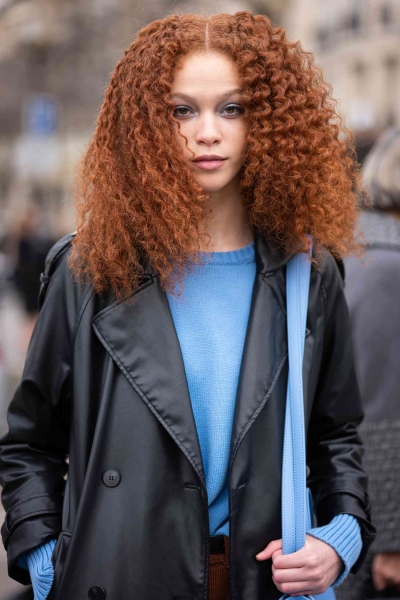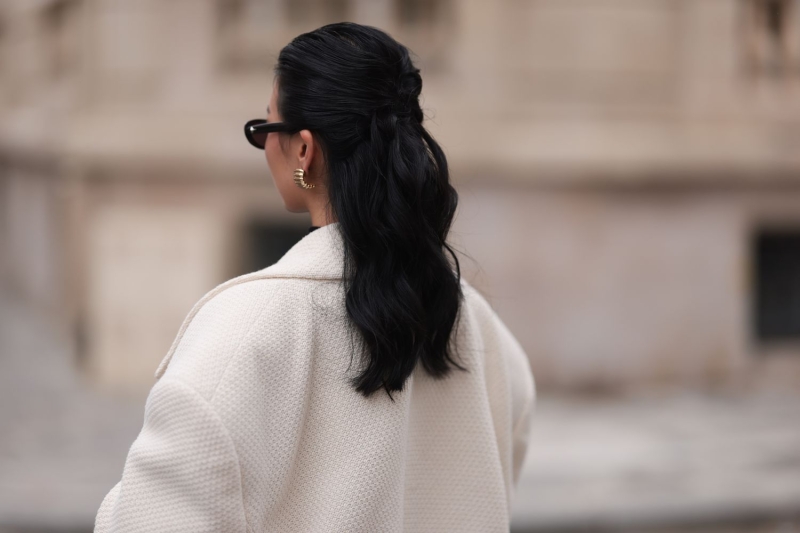Contents
If you’ve ever thought about growing out your hair, you’ve probably heard of biotin, an essential B vitamin. “Biotin is often associated with promoting healthy hair, skin, and nails and can be found in foods like egg yolks, milk, salmon, tuna, nuts, and grains. It’s also made by our bodies in the gut,” says Frances Largeman-Roth, RDN, a nutrition expert and author of Everyday Snack Tray.
Meet the expert
- Dr. Nicole Ruth, MD, DO, FAAD, is a board-certified dermatologist in New York City. Rachel Westbay, MD, is a board-certified dermatologist at Marmur Medical. Nazanin Saedi, MD, a board-certified dermatologist and clinical associate professor at Thomas Jefferson University. Frances Largeman-Roth, RDN, is a nutrition expert and author of Everyday Snack Tray
Many people believe biotin can help grow hair. Ahead, medical experts weigh in on whether there’s any truth behind this thinking.
What is Biotin?
Biotin, a water-soluble B vitamin otherwise known as B7, plays an essential role in converting the food we eat into energy. “It helps the body break down carbohydrates, proteins, and fats, allowing us to absorb and better use nutrients efficiently,” says Nicole Ruth, MD, DO, FAAD, a board-certified dermatologist in New York City. “This process is important for maintaining healthy bodily functions, including metabolism and energy production.”
The Benefits of Biotin
“It’s commonly believed biotin can support hair growth, add volume to fine hair, and reduce hair loss or thinning,” says Dr. Ruth. “While biotin may improve the health of existing strands, the effects on stimulating new hair growth are not as well-established.”
Causes of Biotin Deficiencies
Biotin deficiency can lead to hair thinning, brittle nails, and skin rashes. “In terms of lifestyle habits, excessive consumption of raw eggs, a common addition to protein shakes, can lead to biotin deficiency,” says Dr. Westbay. “Raw eggs contain a protein called avidin, which binds to biotin and prevents its absorption. Chronic alcohol consumption can also impair the body’s ability to absorb biotin, as alcohol interferes with nutrient absorption and metabolism. Diets lacking in biotin-rich foods— such as meats, eggs, nuts, seeds, and certain vegetables—can lead to a deficiency over time, particularly if combined with other factors like malabsorption.”
Long-term use of antibiotics can reduce biotin levels by killing off the gut bacteria that produce small amounts of biotin naturally. “Medications such as Accutane, a prescription commonly used to treat acne, has been associated with reduced biotin levels, possibly due to its effects on the skin and oil production,” notes Dr. Westbay. “During pregnancy, the body’s demand for biotin increases, and some women may develop mild biotin deficiency, which can contribute to symptoms like hair thinning or skin changes.”

Biotin and Hair Growth
"The belief that biotin helps with hair growth likely stems from its well-known role in supporting the production of keratin, a protein essential for hair structure," says Dr. Ruth. “However, there’s a lack of robust clinical studies to definitively prove biotin’s effectiveness in promoting hair growth. Most of the available evidence is anecdotal or comes from small-scale studies that lack the rigor of peer-reviewed white papers."
Biotin and Hair Loss
While the evidence supporting biotin for hair growth is limited and not entirely conclusive, there are some indications biotin can help prevent hair loss, especially in individuals with a biotin deficiency. “Some studies have shown improvement in hair health and volume when biotin is used as part of a supplement regimen in people with poor hair health, but more research is needed,” says Dr. Ruth.
Rachel Westbay, MD, a board-certified dermatologist at Marmur Medical, agrees, saying, “The data on biotin for preventing hair loss is similarly limited and not significantly stronger than the evidence for its role in promoting hair growth. For people who are not biotin deficient, the evidence that biotin can prevent hair loss is weak. Most studies that mention the improvement in hair loss involved people who had poor hair health linked to underlying medical conditions or nutritional deficiencies. Also, some studies involved supplements that contain biotin in combination with other vitamins and minerals and, while they may have shown improvements in hair loss, it’s difficult to determine whether biotin alone was responsible for these effects.”
Effectiveness of Biotin Supplements
“For the average person, taking more biotin than needed is unlikely to provide additional benefits,” says Dr. Ruth. The recommended daily dose of biotin varies depending on age, sex, and age. “There isn’t an official recommended dietary allowance for biotin, but there are adequate intake levels established by health authorities like the National Institutes of Health,” says Dr. Westbay. “Adults should aim for about 30 micrograms of biotin daily, which can typically be obtained through a balanced diet.”
“Two common signs of a biotin deficiency are hair loss and brittle nails,” says Nazanin Saedi, MD, a board-certified dermatologist and clinical associate professor at Thomas Jefferson University. “If you’re biotin deficient, biotin supplements can help restore hair and nail health."
Biotin supplements come in several forms, including tablets, gummies, capsules, and liquid drops, and work by supplying the body with additional biotin. "Despite being the most commonly employed or recommended supplement on internet searches for supporting hair growth, the evidence regarding biotin’s effectiveness is limited and mixed, with most scientific studies focusing on its role in cases of biotin deficiency rather than in healthy individuals,” says Dr. Westbay. “Some case reports and small-scale studies suggest biotin supplements may improve hair quality in people with brittle hair or hair thinning due to underlying health conditions. However, these effects are generally observed in people who had a pre-existing deficiency or poor hair health.”
So, who should be taking biotin? “If you have a deficiency due to a gut health issue, an eating disorder, alcoholism, or you’re a smoker, you would likely benefit from taking a biotin supplement,” adds Largeman-Roth. “Also, women who are pregnant or breastfeeding may have a higher demand for biotin.”
Safety and Side Effects of Biotin
Biotin is generally considered safe, even in higher doses, as it’s water-soluble and excess amounts are excreted in urine. “There’s no established upper limit for biotin intake by health authorities. However, consuming very high doses of biotin from supplements can potentially lead to side effects,” says Dr. Westbay. “Some individuals report an increase in acne or skin rashes and in rare cases, excessive biotin intake could cause mild digestive upset, including nausea, cramping, or diarrhea. There are also anecdotal reports of headaches or insomnia related to very high biotin doses, though clinical evidence for these effects is limited.” Taking very high doses of biotin may interfere with lab test results, leading to false readings for thyroid or heart conditions.
“It’s always best to talk to your doctor before starting vitamin supplementation to ensure it will not adversely interact with your medication or skew lab results,” adds Dr. Saedi.

Biotin in Hair Products
“Though marketed for hair health, there’s limited evidence biotin-infused shampoos, conditioners, and serums can be absorbed effectively through the skin,” says Dr. Westbay. “The benefits from topical application may come from the other ingredients in these products rather than the biotin itself."
While biotin-containing hair products may not directly stimulate hair growth, “There is some evidence that they can strengthen existing strands and reduce breakage,” says Dr. Ruth. A few recommendations from our experts: Hask Biotin Boost Thickening Dry Shampoo, OGX Thick & Full + Biotin & Collagen Shampoo, Better Not Younger Wake Up Call Hair Thickening Spray.
Alternative Solutions to Biotin
Dr. Westbay recommends seeing a board-certified dermatologist to identify the cause of hair loss and determine the most appropriate treatment.
“For hair growth, my go-to recommendations are Rogaine, Nutrafol, and red light therapy,” says Dr. Saedi. “These treatments can be effective on their own, and they also work synergistically.” Other nutrients that support hair health include vitamin D, zinc, and iron. “For hair loss or hair thinning, I recommend treatments including Minoxidil, oral prescriptions like Finasteride or Spironolactone, or in-office procedures such as platelet-rich plasma (PRP) and Keralase. Additionally, a balanced diet rich in protein and healthy fats can help maintain strong, healthy hair,” says Dr. Ruth.
Conclusion
In cases of deficiency, biotin supplementation has been shown to improve hair health and promote growth. However, biotin deficiency is rare, as most people get adequate amounts through their diet and there is limited clinical evidence supporting biotin’s ability to promote hair growth in people who are not deficient. Most studies that suggest biotin helps with hair growth have methodological limitations, such as small sample sizes, lack of control groups, or reliance on self-reported data.
